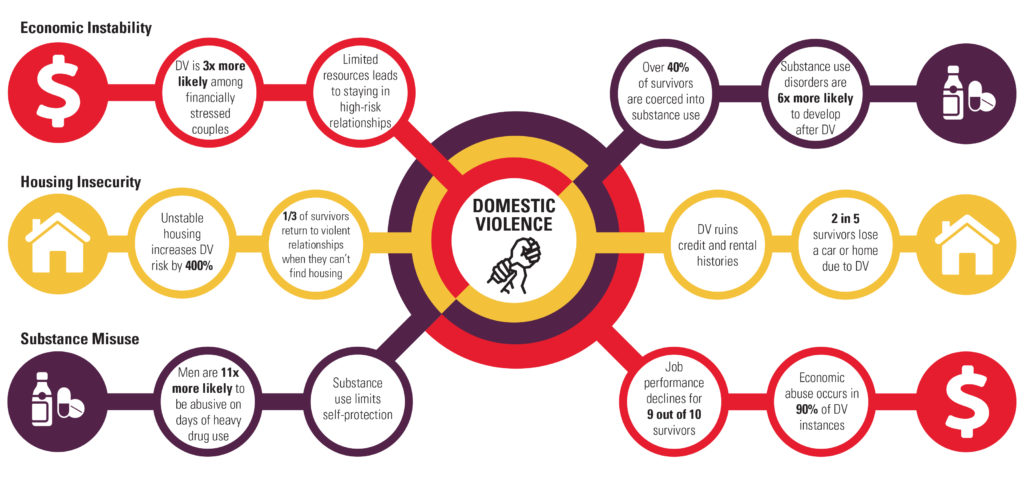Why Leaving Isn’t Always an Option: Identifying the Relationship Between Domestic Violence and Social Issues
March 5th, 2019 | viewpoint
I remember the first time I learned someone close to me was a survivor of domestic violence. I was twelve, I was sad, and I was confused: Why didn’t she just leave?
Thirteen years later, as a woman whose defining decade has been shaped by movements such as #MeToo, Time’s Up, and the Women’s March, I can now see the many reasons why this person couldn’t immediately and safely escape the violence she experienced. As a low-income mother with limited education, she faced many obstacles to seeking sustainable safety—obstacles that I now understand as risk factors for violence.
As part of our ongoing work around domestic violence, JSI is engaging in a series of interviews with survivors across California to explore their help-seeking experiences. One of the clearest messages that we’ve heard emerge from these conversations so far is that domestic violence is a complex issue that does not occur nor can be addressed in isolation.
It is increasingly understood that the conditions in which we are born, live, work, and age play a significant role in the prevention or perpetuation of domestic violence. These social issues include all the factors that influence the quality of our day to day lives, such as the availability of safe housing, education or employment opportunity, affordable childcare, and the cultural norms around us. These issues don’t act alone but are intertwined—for example, people who do not have access to safe housing face insurmountable obstacles to employment, while paying for rent and putting food on the table become challenging without a stable income, which can all lead to negative health outcomes. Unfortunately, these factors play a big role in domestic violence, too.
JSI, with the support of Blue Shield of California Foundation, explored the connections between social issues and domestic violence and published the findings in a new report and accompanying infographic (available in both English and Spanish). Specifically, we look at the relationship between domestic violence and three specific issues:
These issues are just three of many that are both risk factors for and outcomes of domestic violence.
Let’s look at housing as an example:
The JSI California office is located in San Francisco, one of the most expensive places in the world to live. Affordable housing is increasingly limited in the city and, as a result, many San Franciscans experience housing insecurity or homelessness. Not having access to safe, affordable housing heightens a woman’s risk of experiencing partner violence. In San Francisco, 12% of all homeless individuals and 30% of homeless families report domestic violence to be the primary cause of their homelessness. One in four survivors are turned away from San Francisco shelters due to lack of space, placing them at risk for homelessness and continued violence. In general, homeless women are up to four times more likely to experience violence than stably-housed women, and one-third of survivors return to abusive relationships simply because they cannot find safe housing. However, returning to an abusive environment increases a woman’s risk of violence more so than if she had never left.

The relationships between domestic violence and social issues are complex and can perpetuate the cycle of domestic violence. However, properly addressing these relationships can prevent and mitigate domestic violence. The above infographic depicts how these relationships interact with one another and make the case for why, to be properly addressed, they must be addressed together. Responding to individual episodes of domestic violence is not enough to create change—we need to consider the larger, social context in which domestic violence occurs and create comprehensive, multi-sector response strategies that both support survivors and address underlying social issues that perpetuate violence.
If you or someone you know are experiencing domestic violence, free and confidential help is available. The National Domestic Violence Hotline is available 24/7 at 1-800-799-SAFE (7233). You can also dial “2-1-1” to get connected to local resources in your area.
Si usted o alguien que conoce está experimentando violencia doméstica, puede conseguir ayuda gratuita y confidencial. La Línea Nacional Contra la Violencia Doméstica está capacitada para servirle las 24 horas, 7 días de la semana – llame al 1-800-799-SAFE (7233). También puede marcar “2-1-1” para conectarse con servicios locales en su área.
Written by Nicole Giron and Clancey Bateman
We strive to build lasting relationships to produce better health outcomes for all.